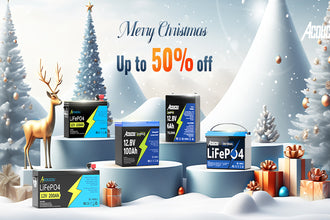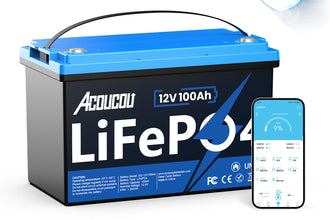

If you want to get your own solar system, lithium iron phosphate battery is a better choice to store excess power, such as 12V 100Ah Acoucou LiFePO4 batteries. Compared with an acid-lead battery, it is lighter, smaller and has a longer lifespan, but it is more expensive. Thus, store properly so that we can use the batteries longer and save more money.
Battery charge
LiFePO4 batteries have a self-discharge rate of 1-3% per month, so they retain most of the charge capacity during storage. They usually are charged to at least 50% of their maximum charge capacity. If not in use for a long time, the batteries should be charged with 50% to 80% of their capacity and charged every 3 months to avoid excessive storage time and irreversible capacity loss caused by excessive discharge of the battery.
Before storing batteries, they should be disconnected anything. For RVs, turning off the electrical system does not mean that without external loads to draw power. We should detach the [+] and [-] wires connected to the battery pack terminals.
Temperature
LiFePO4 should stay in an open and dry area. At the same time, the temperature should be appropriate, not too high or too low. If we store for a short time, the temperature can be from -20 ℃ to 35 ℃ (-4 °F to 95 °F); if we store for a long time, the temperature can be from 10℃ to 35℃ (50°F to 95°F). The storing duration determines the temperature.
- Less than 30 days: -20℃ to 60℃ / -4°F to 140°F
- 30 to 90 days: -10℃ to 35℃ / 14°F to 95°F
- More than 90 days: 15℃ to 35℃ / 59°F to 95°F
Storage in the low-temperature
Although Acoucou batteries can be used from -20 °C to 45 °C and have low-temperature protection, due to the characteristics of lithium iron phosphate batteries, their efficiency still decreases in low-temperature environments. When the temperature is below zero, do not charge outside. It is recommended to charge indoors, such as in a garage, to avoid low temperatures. If there are no indoor charging conditions, it is necessary to fully utilize the residual heat generated during the discharge of lithium batteries.
Use and charge as needed, discharge and charging incompletely. In winter, the activity of lithium iron phosphate batteries decreases, which is very easy to cause over-discharge and overcharging. It can affect the service life of the lithium battery, and even it can damage the lithium battery itself and easily cause swelling and explosion. Therefore, in winter, it is even more important to pay attention to charging for incomplete discharge and charging.

Storage in the high-temperature
Battery storage should avoid high temperatures or direct sunlight. Extreme temperatures may cause the battery to overheat internally, leading to chemical reactions, resulting in uncontrolled voltage drops and even battery fires. Therefore, please avoid storing the battery for a long time in high temperatures or outdoor sunlight.
Regular Checks
Basically, check the outside to ensure cleanliness and undamaged condition. Check if the cables and connections are damaged.
Periodically check the battery's state of charge during storage and recharge it to the recommended storage level if necessary. It is clear and convenient that Acoucou batteries have Bluetooth connecting to the APP to detect the battery data. For voltage, if your battery cannot be activated with a current greater than 1A or if it is activated with a voltage below 10V, which means that it has problems. Do not use the battery until it is fixed.

By following these storage and maintenance guidelines, you can ensure that your LiFePO4 batteries remain in good condition, providing reliable power for your life. With proper care, LiFePO4 batteries can offer a long service life and contribute to sustainable energy solutions.
Order it Now: https://acoucoubatteries.com/collections/lifepo4-battery/products/12v-100ah-lithium-lifepo4-deep-cycle-rechargeable-battery










